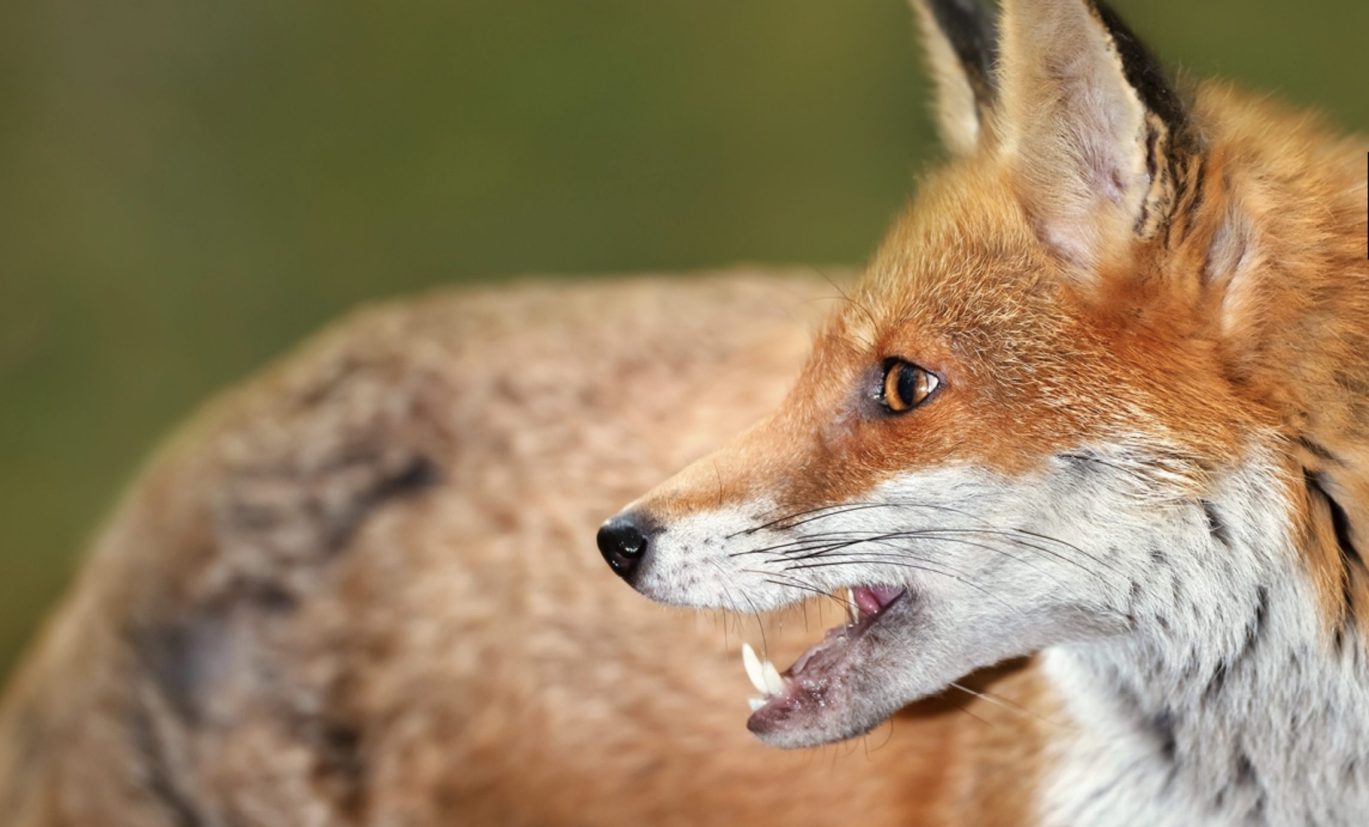
Fox
Well-known for being wily, foxes have adapted to living in different environments and can be found all over Scotland.
On this page:
- Where do foxes live?
- What do foxes eat?
- That’s wild
- When are fox cubs born?
- Foxes visiting your garden
- Can I deter foxes from my garden?
- Can I feed a fox?
- Can I keep a fox as a pet?
- Do foxes carry diseases?
- Persecution of foxes
- Snares and traps
- Hunting and animal baiting
- Pest control
- Common problem for foxes
Whilst large populations live in rural areas, many others are more at home in our towns and cities.
The type of fox found in Scotland is the European fox which is famed for its distinctive red fur, white chest, pointy ears and bushy tail.
Although foxes can live up to around nine years in the wild, the majority will only survive a few years, mostly due to road traffic accidents. Foxes are typically active from dusk into the night when there are fewer people around, but can sometimes be spotted in the day during the mating season.
Where do foxes live?
Once associated with more rural habitats, foxes are now widespread across mainland Scotland. Urban foxes, first enticed into towns and cities by the lure of more reliable sources of food, have adapted well to living closer to humans.
Foxes are fiercely territorial animals. They are excellent diggers and live underground in excavated burrows called earths or dens. These can be dug using a rabbit warren as a starting point, or can be made from scratch.
It’s easy to mistake a fox earth for a badger sett. However, foxes bring food back to the den so fur or feathers around the entrance would indicate that a family of foxes lives there.
Foxes are very adaptable and can live above ground too so you may find them denning in a sheltered spot, like under your shed.
What do foxes eat?
Foxes are omnivorous hunters with a very diverse diet, meaning they can eat small animals they catch like rabbits, rodents, birds and frogs but will also enjoy fruit and berries.
Urban foxes will also scavenge for food, feasting on anything left behind by humans.
That’s wild
If foxes come across a large supply of food, they will stockpile anything they don’t eat right away to feed on later.
When are fox cubs born?
Foxes are social animals and the family unit usually consists of a breeding pair and their young.
Mating takes place in Winter. Listen out for the loud barking or screaming noises they make as they try to attract a mate and ward off rivals. Although this can sound alarming, it’s not a cause for concern and the foxes do not need our help.
The female will give birth to a litter of around four or five cubs in spring. Fox cubs are born on the bare ground of the den.
Fox cubs are born deaf and blind. Like domestic puppies, they depend on their mother’s milk until they can start eating solid food at around four weeks old. Fox cubs are usually completely weaned by the time they are twelve weeks of age.
By Autumn, the cubs should be fully self-sufficient and will leave to find their own territories.
Foxes visiting your garden
It’s fairly common for foxes living in towns and cities to venture into gardens, seeking food and shelter. Whilst it can be exciting to see a fox in your garden, wild animals can be unpredictable.
Always maintain a safe distance from foxes as they can bite when they feel threatened by humans, particularly if they have cubs.
Can I deter foxes from my garden?
Foxes are protected from abuse and ill treatment by the Wild Mammals (Protection) Act 1996.
This makes it an offence to cause harm to any wild mammal with intent to inflict unnecessary suffering. Penalties can include a £5000 fine or six months in prison.
If you have a persistent problem with foxes entering your garden, there is plenty of humane steps you can take before breeding season (December to February) to discourage them without causing harm.
Foxes will scavenge through litter for food so make sure your bins are secure and the lids are closed. You should also check there are no food sources in your garden as foxes will continue returning to a location if there is a ready supply.
Keep your garden clean and tidy. Foxes are at home in areas which offer great shelter, so an untidy and overgrown garden is great for that. Make sure there are no gaps under sheds and other structures to prevent foxes from making a den.
Fencing or prickly plants may also deter foxes.
Foxes are territorial animals, meaning if one leaves your garden, another fox is likely to turn up to claim it. You can try using an artificial scent-marker to deter a fox. It is against the law to use any substance to deter foxes which has not been approved for such use and the Scottish SPCA will investigate any reports of foxes being harmed in this way. Using inhumane deterrents such as broken glass or spikes on walls and fences can cause serious harm to foxes and other animals.
Can I feed a fox?
There’s no law against feeding foxes, however, we would not recommend providing food for them because:
- They will eventually lose the ability to hunt for themselves, an essential skill for survival in the wild.
- Certain foods could cause harm to foxes such as chicken bones and grapes or raisins.
- Food may attract other animals including rodents or other people’s pets.
- Your neighbours may not wish to encourage them.
Never attempt to get too close or hand-feed foxes.
Can I keep a fox as a pet?
We would strongly recommend people do not attempt to domesticate foxes. They are naturally wild and it is not in the best interests of their welfare to be kept as a pet.
If you have come across a fox cub you think might have been abandoned but looks healthy, please leave the animal alone and check our advice on lone baby animals.
Do foxes carry diseases?
Like most mammals, foxes can carry a range of parasites and diseases, such as fleas, ticks and ringworm, which theoretically could affect humans. It’s best to avoid touching any wild animal but if you absolutely have to, wear protective gloves and wash your hands thoroughly afterwards.
Persecution of foxes
With more houses being built in green spaces, foxes face a loss of habitat and move closer and closer to cities to find food and shelter. Sadly, urban foxes have gained a bit of a reputation as a pest species because they scavenge through waste looking for food. Also, when food is scarce, there can be instances where foxes kill and eat domestic birds like hens and ducks. However, they can also be seen as a welcome addition to gardens by wildlife lovers.
Snares and traps
We support an outright ban on the use of snares and we want tighter regulations around traps due to the level of suffering caused.
However, unfortunately, snares and traps can still be used legally to catch foxes. Snares must be set correctly by a trained and authorised individual. All snares must have a ‘stop’ on them to prevent them from over-tightening. A legal snare or trap will have an ID tag and must be checked every 24 hours.
It is illegal for anyone to tamper with a legally set snare or trap so we would ask the public not to attempt this. If you suspect a device is set illegally, call our helpline immediately on 03000 999 999.
Hunting and animal baiting
We strongly oppose the killing of any animal for ‘sport’. It is against the law to hunt a wild mammal using a dog except in limited circumstances, such as preventing the spread of disease or protecting livestock. In these limited circumstances packs are limited to two dogs and the animal must be humanely dispatched immediately by a licensed marksman to prevent suffering.
Unfortunately, illegal hunts and animal fighting still take place in Scotland. It is a barbaric practice which has no place in a civilised society.
If you know of anyone involved in animal fighting, or suspect it is happening in your area, you can report it to Police Scotland’s wildlife crime unit by calling 101.
Pest control
It is not illegal to use lethal methods of pest control to cull foxes for the purposes of protecting livestock and preventing damage to crops or property, but the animal must be humanely dispatched to prevent suffering.
Any damage to property or land caused by foxes is the responsibility of the landowner. Likewise, poultry owners who have problems with foxes are responsible for keeping their animals safe.
If you suspect someone is using illicit means to control the species, please contact us on 03000 999 999.
Other common problems
Road traffic accidents
Sadly, the greatest threat to foxes is humans. Many foxes are hurt or killed in road traffic collisions every year. Click here for further advice.
Sick or injured foxes
If you come across a fox that is immobile or unable to move normally, call our helpline on 03000 999 999.
Signs to be aware of include:
- Twitching
- Not reacting to noise
- Falling over
- Not moving away when approached by a human
- Open wounds
- Breathing with mouth open or panting heavily
- Lots of flies around the fox
Foxes who are limping but otherwise look healthy do not usually need our help as it’s likely to be the result of a historic injury which has healed incorrectly.
Abandoned fox cubs
It is normal for a vixen to leave her young in a safe place while moving from one disturbed den to another location or when the cubs are being weaned.
March/April – leave the cubs alone and monitor them from a safe distance for at least three hours.
May onwards – Monitor for a minimum of six to twelve hours.
Supporting documents
Hunting with Dogs (Scotland) Bill
Wildlife and Natural Environment (Scotland) Act 2011 – Legislation on the use of snares
Support us from £5 a month
It costs us £63,000 every day to continue the work that animals across Scotland depend on. Our work is only possible because of the generosity of people like you.

